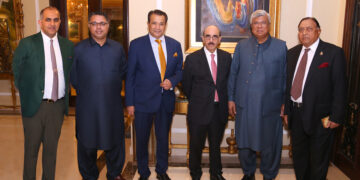The spread of disinformation over the Internet and social media is a major international challenge that affects us all. Intentionally and verifiably false “fake news”, in other words “outright lies”, is designed to manipulate people’s perceptions of reality. Hiding the real events or causes of those events, the purpose is to hide culpability of the persons guilty of causing them, to keep power in one’s hands or reach a political or economic goal to this end. Lying and disinformation through the centuries has been used and even propagated as a valid tool of war, notably by the Indian author Kautilya as described in his 24 centuries old “Arthashastra”. Take the infamous “Polish incident” as recent as World War 2, where prisoners in Polish military uniform were made to attack German border posts, thus giving a pretext for Germany to declare war on Poland. Hitler’s propaganda Chief Joseph Goebbels was notorious for embellishing facts with fiction.


In the 20th century Lord Ponsonby’s “Falsehood in War-time” identified the role propaganda played during the First World War by listing more than 20 falsehoods being circulated. These falsehoods were regarded as a fundamental part of the way the war effort was created and sustained, Ponsonby states that without lies there would be “no reason and no will for war”.
The matter has reached an entirely different dimension in the 21st century because advanced globalization, i.e. the interconnectedness and interdependence of the world that makes the decision taken by one country reverberate in a whole continent or even globally. Secondly, the new technologies of internet and social media have in a way decentralized information and disinformation making it impossible to control or direct from one hand. Information released through those electronic sources is so huge that it is impossible for a person to sift through it all and to decide what is real and what is fake. That opens new gates for disinformation in the hands of all kinds of political, military, economic and social forces to instigate or cause conflict and/or to influence the direction it takes. Outright lies have become a means of politics not only of underground villains but they have become an acceptable means of elected politics. Consider British PM Tony Blair’s blatant lies about the presence of “weapons of mass destruction” in Iraq to justify war against that country to the national and global public; he has never been punished for it. Lying becoming acceptable speaks volumes about the erosion of stated values among the western countries that had created the idea of democracy and its underlying value system.
Cambridge Analytic were able to predict people’s political preferences and issue interests. Donald Trump’s chief strategist Steve Bannon coordinated this information to target political advertisements and memes on Facebook, focussing mainly on discrediting Hillary Clinton’s Presidential campaign and influencing Americans on a number of pro-Trump issues. Often inflammatory, sensationalistic, sometimes violent, and false messages, this strategy is part of the political tool kit of govts and politicians, undermining the trust of the citizens in the govt and its institutions and in democracy as such.
Fake news has been used to influence politics and start wars globally. But it has also become a method to stir up and intensify social and ethnic conflict within countries. The terms used are sometimes innocuous, among them the role of the reformed British 77th Brigade (named after the famous Chindits of World War 2 who operated behind Japanese lines in Burma) is to “lead on special influence methods”, ie spread motivated stories intentionally to mislead readers to grow mistrust among people. This mistrust results in incivility, protest over imaginary events, or violence. This unravels the fabric of civil life, turning neighbour against neighbour. Why would anyone do this? People, organizations, and governments—foreign governments and even our own—use fake news for different reasons, among them to distract people from important issues so that these issues remain unresolved and the culprits hidden.
Thus, the spread of fake news and disinformation is dangerous for societies and countries worldwide, and therefore doubts and fears are being raised even against true events and information, and uncertainties and prejudices are growing in large parts of the population. At the end of the day fake news undermine social, political and economic peace, endanger the national cohesion of societies and the very existence of countries.
In India, the home land of Kautilya, the art of fake news has been developed to the highest level, the major goal being the defamation of Pakistan. Be it Mumbai attacks or others Indian fake news have done a big service to maligning Pakistan in the world. BBC News reports that many of the fake news websites are run by Indian Srivastava Group, which was responsible for anti-Pakistan lobbying efforts in Europe and was persistently linked to the dissemination of fake news and propaganda. But Pakistan has learnt the lesson as well. According to a Geo TV report Benazir Shah and Zarghoon Shah filed a report in 2019 about PML (N)’s Strategic Communications Cell, established in 2013 in the PM’s House with 38 employees, some later put the figure rising to 300. The cost in 2013, a whopping Rs. 40 million per month directly from the PM’s “discretionary grant” was a page out of Uncle Modi’s handbook Arthashastra. The team was unleashed to smear rival leaders (any or perceived opposition, even the Army). After all, why were many of the Mian Nawaz Sharif’s ministers sent home? While the blatant falsehood was quite brilliant, unfortunately it was overkill. The offending “Dawn Leaks” crossed the fail-safe line by openly maligning the Army in line with Indian propaganda! It is very good of the Army to not only forget this but to also forgive the perpetrators.
Today fake news has become an accepted means of war (and peace) in all spheres, the consequence being to make us self-destructive. When it is almost impossible to know truth from lies, we are undermining our own system. There is a growing debate what could be done to fight fake news. To start with, there is a need to stop condoning it by regarding fake news as a trivial offence. Once a news has been identified as fake and a lie, the person/people responsible for stating/emanating it have to be punished. There need to be laws for that and those laws need to be implemented. To go very deep into the psyche of our people – lying as such, even in small cases like finding an excuse for late arrival, for having missed a deadline and others have to be discouraged. It is a problem of ethics and belongs in the hands of parents/families and schooling. Because once small lies are considered acceptable, big ones tend to fall into the same category! Who will draw the red line?
Who has the moral courage to face up to the truth?


















